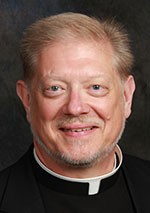That All May Be One / Fr. Rick Ginther
‘Shall you wash my feet?’ A question worth pondering
 “You will never wash my feet!” (Jn 13:8). So declared Peter in the Gospel reading on Holy Thursday.
“You will never wash my feet!” (Jn 13:8). So declared Peter in the Gospel reading on Holy Thursday.
Well, we know that Peter’s feet were washed. He had been chosen, as the other 11 Apostles, by the Lord.
Let us look at some of those so chosen.
Peter: whose outbursts through the Gospels are legendary; whose denial is painful to witness; whose remorse moves our hearts.
James and John: who sought power and prestige through the begging words of their mother.
Andrew: the younger brother, who brought Simon to the Lord, and later fled.
Judas: the betrayer. Yes, in John’s Gospel account, Judas’ feet are washed before he steals away.
In a similar manner, for centuries, popes, bishops and priests have chosen from among the faithful those whose feet were washed, believers in the great mystery of Christ, bearers of the faith through baptism, anointing and Communion.
Sadly, disunity disrupted the centuries of choosing. East and West became East vs. West. Catholic became Catholic vs. non-Catholic. And recent schism continues to mar the One Body of Christ.
This lamentable brokenness may seem incurable. Complete healing has yet to occur. And yet, a balm for such mending has begun to soothe the wounds.
“Shall you wash my feet?” This is now the question.
Since his first Holy Thursday as bishop of Rome in 2013, Pope Francis has chosen to wash the feet of men and women and people of various faiths or none at all. This has happened in intimate celebrations of the Mass of the Lord’s Supper in ways that have been symbolic and unexpected.
The scandal for Peter of that first washing is being repeated as a scandal for our modern times.
In 2013, Pope Francis washed the feet of 12 young people, two of them women, and two of them Muslim, at Rome’s juvenile detention center, Casal del Marmo.
In 2014, at Don Gnocchi, a center in Rome for the elderly and disabled, the participants in the foot-washing ritual ranged in age from 16 to 86, and several were in wheelchairs with their feet swollen or disfigured. Four of them were women.
In 2015, at Rome’s Rebibbia Prison, Pope Francis washed the feet of 12 inmates, men and women, from Nigeria, Congo, Ecuador, Brazil and Italy—as well as one toddler.
In 2016, at a center for asylum seekers in Castelnuovo di Porto, a municipality just north of Rome, the Holy Father washed the feet of refugees, including Muslims, Hindus and Coptic Orthodox Christians.
Last Thursday, at Paliano Prison, 30 miles south of Rome, Pope Francis washed the feet of members and associates of organized crime groups who are cooperating with anti-mafia forces in exchange for reduced sentences.
Scandal: stumbling block? Or a stone, not unlike the “stone rejected by the builders” to give us pause?
If, as taught by the Second Vatican Council we are to move toward being one, to set our faces to the world, then the people whose feet Pope Francis has chosen to wash is an example of the mandate of Jesus to us to wash each other’s feet.
Yes, there is that unique Catholic moment in our parishes. But it appears that uniqueness has an expanded reach as a balm for all humanity.
“Shall you wash my feet?”
(Father Rick Ginther is director of the archdiocesan Office of Ecumenism. He is also pastor of Our Lady of Lourdes Parish in Indianapolis.) †
 “You will never wash my feet!” (Jn 13:8). So declared Peter in the Gospel reading on Holy Thursday.
“You will never wash my feet!” (Jn 13:8). So declared Peter in the Gospel reading on Holy Thursday.